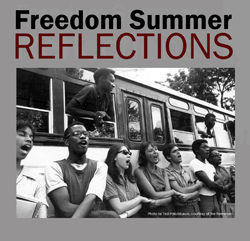
Editor’s note: Fifty years ago today, President Lyndon B. Johnson signed the U.S. Civil Rights Act into law. “Let us close the springs of racial poison,” he said in a televised address to the nation before taking up his pen. Retired United Methodist Bishop Melvin G. Talbert reflects on a few immediate changes brought by the Civil Rights Act and why it remains relevant today.
Since the passage of the Civil Rights Act 50 years ago, there have been ongoing discussions, pro and con, regarding its relevance and significance in our society. Of course, I must view this matter through the lens of one who is an African American.
Allow me to get personal to bring this matter home in a concrete way.
As a young lad growing up in Louisiana, I noticed that all police cars had a sign that read: “To protect and to serve.” I knew that sign did not mean me. The only encounters I had with the police were to “keep me in my place,” which included racially segregated housing, communities, schools and churches, and restrictions in public accommodations, such as restaurants, hotels, drinking fountains, transportation and parks.
The enactment of the 1964 Civil Rights Acts meant the sign on the police cars included me.
Prior to 1964, my wife and I drove from Knoxville, Tennessee, to Los Angeles. We passed many restaurants and hotels, but none was available to us as African Americans. We had to risk sleeping in our car off the side of the road. Our meals consisted of food we purchased in advance from a grocery store. Even fast-food places would not accommodate us.
In 1967, my wife and I drove across the country from California to Louisiana, and then up to West Virginia. Because of the 1964 Civil Rights Act, that trip marked the first time we were able to use restaurants and hotels, but we had to have advance reservations.
For you see, even with the passage of the law, if we did not produce a reservation receipt we invariably were told there were no vacancies (no room in the inn). But the advance reservation receipt enabled us to secure a hotel room.
Why a law?
The late Dr. Martin Luther King Jr. was a proponent of nonviolence. He taught that love is the most powerful motivating influence for bringing about change. I remember once he was asked, “If you are such an advocate for love, why do we need a Civil Rights Act?”
He said: “The law cannot make you love me, but it keeps you from putting your foot on my neck as I try to live a normal life promoting love and peace.”
From my perspective, we need the Civil Rights Act now more than ever. With all gerrymandering of political districts and the voter suppression going on all across our country, we need a strong Civil Rights Act to prevent racist politicians from intentionally crafting laws and procedures that violate the rights and privileges of people of color.
In our church, we have beautifully and wonderfully crafted statements calling for and affirming civil rights for all. Yet, in the face of current movements of obstructing government and services for the common good and for the least among us we are silent. For you see, many of those who are proponents of such actions are members and leaders in our churches.
On this 50th Anniversary Celebration of the Civil Rights Act, United Methodists must begin with an act of confession and repentance for not being faithful to the call of our church in these turbulent times. We should renew our commitment to the call of the Prophet Micah: “(God) has told you, O mortal, what is good; and what does the Lord require of you but to do justice, and to love kindness, and to walk humbly with your God?” (Micah 6:8 NRSV).
Talbert is a retired bishop in The United Methodist Church. He was a veteran of the Civil Rights Movement. After an arrest for trying to eat at a restaurant designated solely for whites, he spent three days and nights in the same jail cell as Dr. Martin Luther King Jr.
News media contact: Kathy Gilbert, Nashville, Tenn., (615) 742-5470 or [email protected].
Like what you're reading? Support the ministry of UM News! Your support ensures the latest denominational news, dynamic stories and informative articles will continue to connect our global community. Make a tax-deductible donation at ResourceUMC.org/GiveUMCom.




